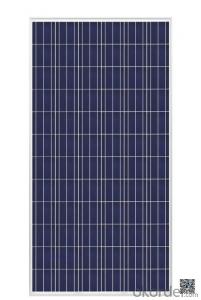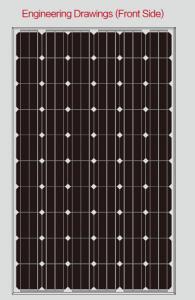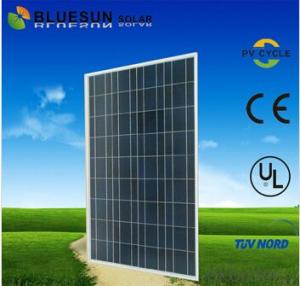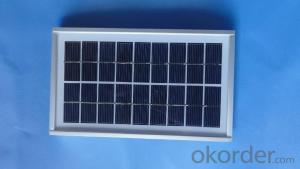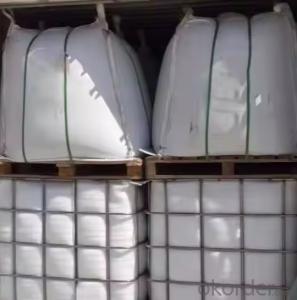SOLAR PANELS,SOLAR PANEL FOR BEST PRICE ,SOLAR MODULE PANEL WITH FULL CERTIFICATE
- Loading Port:
- Shanghai
- Payment Terms:
- TT OR LC
- Min Order Qty:
- 2500 watt
- Supply Capability:
- 25000 watt/month
OKorder Service Pledge
OKorder Financial Service
You Might Also Like
Item specifice
We now provide
• Monocrystalline Solar Panel
• Polycrystalline Solar Panel
Features of our products:
• High conversion efficiency mono/poly-crystalline amorphous silicon solar cells
• Modules incorporate high performance bypass diodes to minimize the power drop caused by shading
• High transmittance, low-iron tempered glass
• High performance EVA encapsulant to prevent destroying and water.
• AI frame: without screw, corner connection. 8 holes on the frame can be installed easily
• Good performance of preventing from atrocious weather such as wind and hails
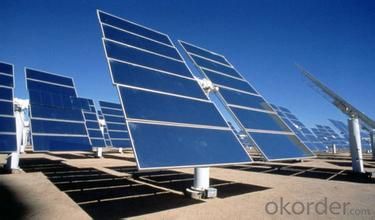
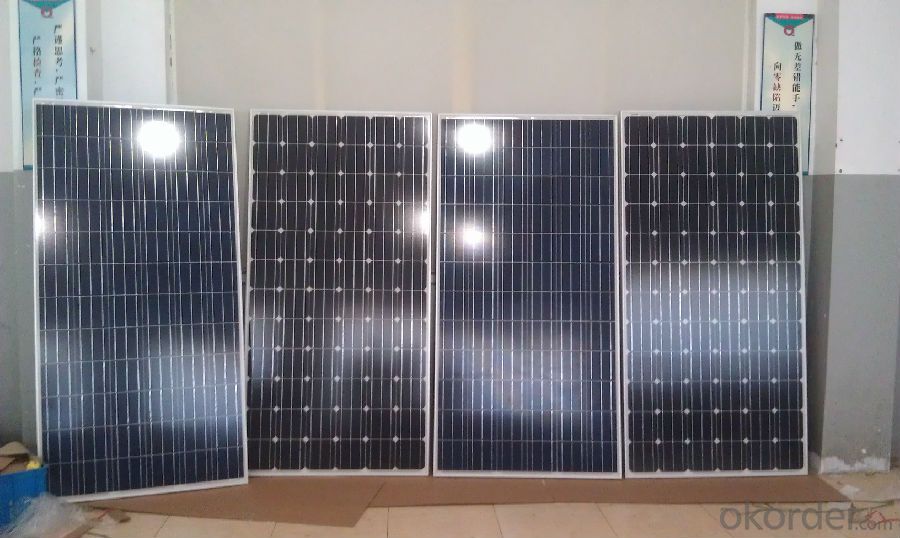
Polycrystalline Silicon Solar Modules 48Cell-195W Specification
ELECTRICAL PERFORMANCE | |||
Power output | P max | W | 195 |
Power output tolerances | ΔP max | W | 0/+5 |
Module effi ciency | η m | % | 14.7 |
Voltage at Pmax | V mpp | V | 23.7 |
Current at Pmax | I mpp | A | 8.03 |
Open-circuit voltage | V oc | V | 30.1 |
Short-circuit current | I sc | A | 8.65 |
Product Description:
This installation Manual contains essential information for the electrical and mechanical installation that your must know before installing CUSTOMER PV modules. This also contains safety information you need to be familiar with .All the information described in this manual are the intellectual property of CNBM and based on the technologies and experiences that have been acquired and accumulated in the long history of CUSTOMER. This document does not constitute a warranty, expressed or implied.
CUSTOMER does not assume responsibility and expressly disclaims liability for loss, damage, or expense arising out of in anyway connected with installation, operation, use or maintenance of the PV modules. No responsibility is assumed by CUSTOMER for any infringement of patents or other rights of third parties that may result from use of PV module.
CUSTOMER reserves the right to make changes to the product, specifications or installation manual without prior notice.
Solar panel working process
In addition to being the ultimate source of all life on earth, the sun is an infinitely renewable, completely pollution-free source of electricity. Instead of burning fossil fuels dug up from the ground in a big power plant – a very 19th century, industrial age approach, when you think about it – solar panels convert sunlight directly into electricity, with no harmful emissions.
The basic unit of a solar panel is a solar cell, which usually consists of one or two layers of silicon-based semiconductor wafers. When struck by the photons in sunlight, the solar cell generates an electrical charge due to the "photovoltaic effect" – which is a pretty good name, since it produces voltage from photons. The flow of these electrons moves in a steady electrical current from one side of the cell to the other.
Dozens of these PV cells are packaged together into solar modules, which in turn are packaged into solar panels that are mounted on a rooftop and arranged to maximize their hours of exposure to direct sunlight. Because the electricity generated by all those solar cells is direct current (DC), it is then sent to an inverter that transforms the power into the same alternating current (AC) used by the appliances in your home and the local utility electricity distribution grid. Increasingly, these inverters are getting "smart," providing data monitoring for solar installation performance and other grid integration services.
FAQ of Solar Module
1. Q: Do you have your own factory?
A: Yes, we have. Our factory located in Jiangyin city, jiangsu province.
2. Q: How can I visit your factory?
A: Before you take off from your country, please let us know. We will show you the way,or arrange time to pick you up if possible.
3. Q: Do you provide free sample?
A: Usually we do not offer free sample
4. Q: Could you print our company LOGO on the nameplate and package?
A: Yes, we can do that.
- Q:How efficient are the solar panels....?
- DS's solar panels convert 22% of their available energy into electrical power. This may not sound very good, but it is much better than most solar panels. Most solar panels on people's houses, for example, are fairly inefficient. Less than 4% of the energy that reaches them will be converted to electricity. DS's panels are so efficient, in fact, that unless the ion propulsion drive is running, DS is producing far more power than it needs.
- Q:Has anyone had roof problems caused by rooftop solar panels?
- Rooftop solar panels might cause all sorts of maintenance or poor installation problems but I rather doubt at this point if we can say that there is an issue with solar panels in general that will cause a problem with the roof. Rather solar panels tend to shade a roof on its most exposed side. Without solar panels southern facing roofs will wear out faster than northern facing roofs. Installed solar panels will tend to make the roof last longer.
- Q:Can solar panels be used to power electric vehicles?
- Yes, solar panels can be used to power electric vehicles. Solar power can be harnessed to charge the batteries of electric vehicles, providing a renewable and sustainable source of energy. This allows electric vehicles to operate with reduced reliance on traditional grid electricity and contributes to a greener transportation system.
- Q:Can solar panels be installed on a warehouse or distribution center?
- Yes, solar panels can be installed on a warehouse or distribution center. In fact, these large, flat rooftops are often ideal locations for solar panel installations due to the ample space available for positioning the panels. The electricity generated by the solar panels can be used to power the operations of the warehouse or distribution center, reducing reliance on traditional energy sources and decreasing carbon emissions.
- Q:name things someone could use solar panels for or make with solar panels? (use solar energy i mean?)
- All depends on how many watts you have. I ran a small boom box off a 5w panel before with no problem. The higher the wattage, the more you can run.
- Q:How much energy can be generated from a solar panel on a clear, bright summer's day for example?
- it depends on the size of the panel and if it is installed in an optimal location. there are many 00W panels commercially available and they can be ganged for a number of different output configurations.
- Q:Can solar panels be installed on a school or educational institution?
- Yes, solar panels can be installed on a school or educational institution. In fact, many schools and educational institutions are increasingly adopting solar energy as a sustainable and cost-effective solution for their power needs. Solar panels can be installed on rooftops, parking lots, or open areas to generate clean electricity, reduce carbon emissions, and provide educational opportunities for students to learn about renewable energy.
- Q:Can solar panels be installed on mountain huts or lodges?
- Yes, solar panels can be installed on mountain huts or lodges. In fact, mountain huts and lodges are often ideal locations for solar panel installations due to their remote locations and ample access to sunlight. Solar panels can provide a sustainable and reliable source of electricity for lighting, heating, and powering various appliances in these mountainous areas.
- Q:Can solar panels be used in commercial buildings or industrial settings?
- Yes, solar panels can definitely be used in commercial buildings or industrial settings. In fact, many businesses and industries are increasingly adopting solar energy systems to reduce their reliance on traditional energy sources and lower their carbon footprint. Solar panels can be installed on rooftops, parking lots, or other available spaces, providing clean and renewable energy to power various operations and meet the energy demands of commercial and industrial facilities.
- Q:how big of an solar panel do i need to power/charge my laptop?would one from canadian tire sell the right one?
- Most decent laptops can use 50W of power or more....so you'd actually need a large solar panel with good sunlight. I just looked up how big a 50W solar panel is....it's about 64x64 centimeters...which is very big and expensive! So, solar power may not be the best solution to power, or charge a laptop battery. Maybe there are some solar powered chargers that charge the battery very slowly, but probably not.
1. Manufacturer Overview |
|
|---|---|
| Location | |
| Year Established | |
| Annual Output Value | |
| Main Markets | |
| Company Certifications | |
2. Manufacturer Certificates |
|
|---|---|
| a) Certification Name | |
| Range | |
| Reference | |
| Validity Period | |
3. Manufacturer Capability |
|
|---|---|
| a)Trade Capacity | |
| Nearest Port | |
| Export Percentage | |
| No.of Employees in Trade Department | |
| Language Spoken: | |
| b)Factory Information | |
| Factory Size: | |
| No. of Production Lines | |
| Contract Manufacturing | |
| Product Price Range | |
Send your message to us
SOLAR PANELS,SOLAR PANEL FOR BEST PRICE ,SOLAR MODULE PANEL WITH FULL CERTIFICATE
- Loading Port:
- Shanghai
- Payment Terms:
- TT OR LC
- Min Order Qty:
- 2500 watt
- Supply Capability:
- 25000 watt/month
OKorder Service Pledge
OKorder Financial Service
Similar products
New products
Hot products
Hot Searches
Related keywords
